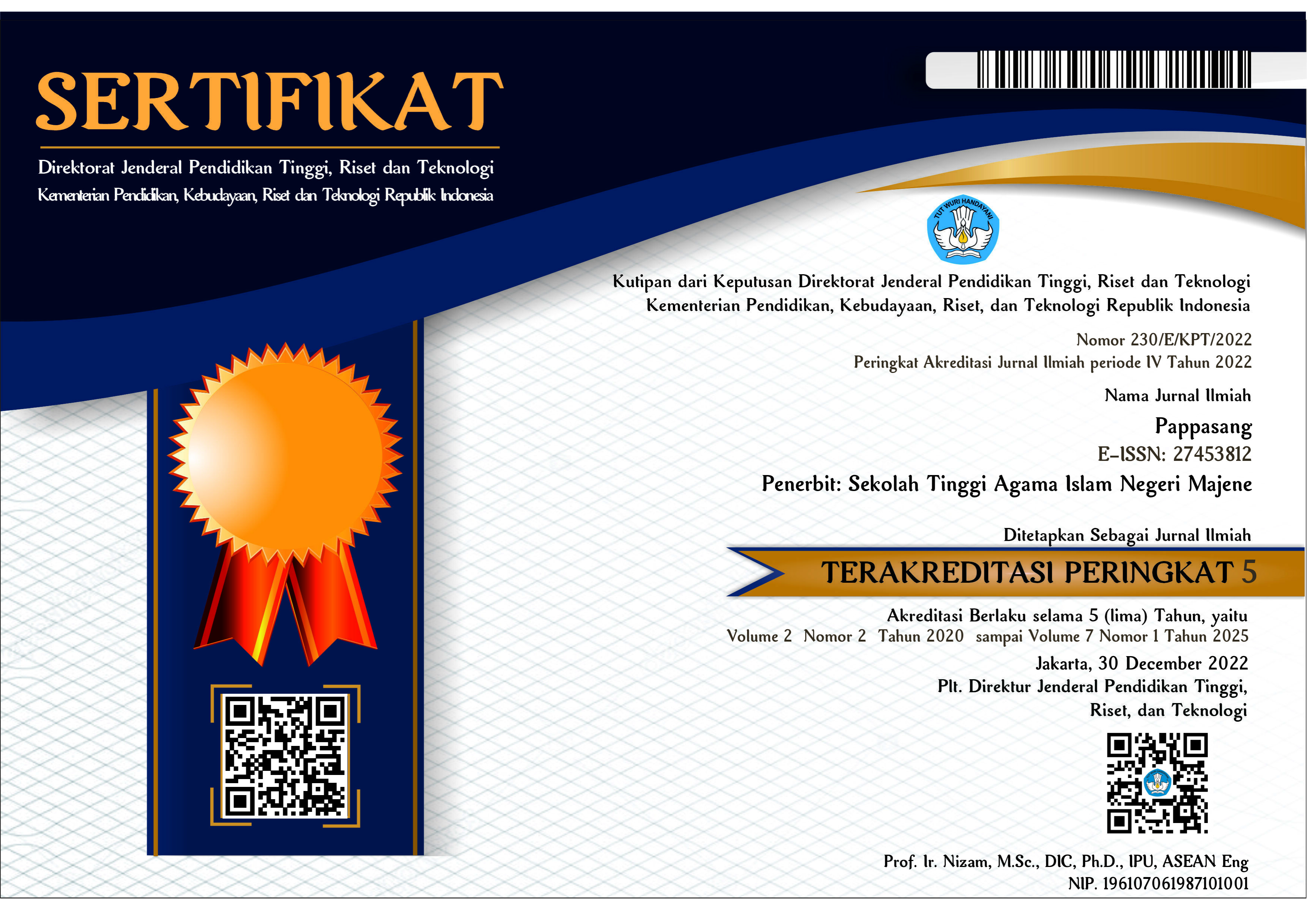Reinterpretasi Konsep Halal: Analisis Semantik Kata Ḥalāl dalam Wawasan al-Qur’an
DOI:
https://doi.org/10.46870/jiat.v6i2.1081Keywords:
halal, ; qur’anic semantics, reinterpretation, contextualAbstract
This paper departs from the basic assumption that the use of the concept of halal in people's lives today has misconceptions and reductions in meaning and ignores its ethical aspects. The urgency of this research is to try to provide a fundamental and paradigmatic meaning of the word ḥalāl so that it becomes a conceptual basis when used in various aspects of life, such as halal food, halal medicines, halal cosmetics, halal tourism, and halal ecosystems. By using a semantic approach, this research will examine the original meaning, relational meaning, and semantic field generated by the words ḥalāl and words that are similar to the verb ḥ-l-l in the Qur'an.
Tulisan ini berangkat dari asumsi dasar bahwa penggunaan konsep halal dalam kehidupan masyarakat saat ini memiliki miskonsepsi dan reduksi makna serta mengabaikan aspek-aspek etisnya. Urgensi penelitian ini adalah berusaha memberikan pemaknaan kata ḥalāl secara fundamental dan paradigmatis agar menjadi dasar konseptual ketika digunakan dalam berbagai aspek kehidupan, seperti makanan halal, obat-obatan halal, kosmetik halal, wisata halal, dan ekosistem halal. Dengan menggunakan pendekatan semantik, penelitian ini akan mengkaji makna dasar (original meaning), makna relasional (relational meaning), dan medan semantik (semantic field) yang ditimbulkan oleh kata-kata ḥalāl serta kata-kata yang seakar dari verba ḥ-l-l dalam Al-Qur’an.
References
Ahmed, M. J., & Akbaba, A. (2020). Halal Tourism : Definitional, conceptual and practical ambiguities. Journal of Tourism Research Institute, 1(2).
Akbar, A. F. R., Rifaannudin, M., & Nurhasanah, S. (2022). Halalan Thayyiban fi Al-Qur’an ‘inda Wahbah Al-Zuhaily fi Tafsir Al-Munir. Studia Quranika, 6(2), 293. https://doi.org/10.21111/studiquran.v6i2.7305
Alimin, Gunawan, F., Muttaqin, A., & Boulahnane, S. (2022). Sexuality communication ethics in the Qur ’an : A semantic analysis on coitus verses. HTS Teologiese Studies / Theological Studies, 78(1), 1–11.
Antara, P. M., Musa, R., & Hassan, F. (2016). Bridging Islamic Financial Literacy and Halal Literacy: The Way Forward in Halal Ecosystem. Procedia Economics and Finance, 37(16), 196–202. https://doi.org/10.1016/s2212-5671(16)30113-7
Chishti, S. A. (2015). Re-thinking Jihād: A Semantic Analysis of the Qur’anic Vocabulary. Al-Bayan Journal of Qur’an and Hadith Studies, 13, 1–24.
Christiansen, J. L. (2015). The dark Koran: A semantic analysis of the Koranic darknesses (zulumat) and their metaphorical usage. Arabica, 62(2–3), 185–233. https://doi.org/10.1163/15700585-12341352
Destiana, R., & Astuti, R. S. (2019). Pengembangan Pariwisata Halal di Indonesia. Collaborative Governance Dalam Pengembangan Pariwisata Di Indonesia, 01, 331–353.
Hermawan, E. (2019). Strategi Kementerian Pariwisata Indonesia dalam Meningkatkan Branding Wisata Halal. Jurnal Ilmu Manajemen Dan Akuntansi, 7(2), 87–95.
Isa, M., Jalil, A., Lada, S., Bakri, M. A., & Hassan, Z. (2021). Halal Cosmetics Repurchase Intention: The Role of Marketing in Social Media. Journal of Islamic Monetary Economics and Finance, 7(4), 629–650.
Izutsu, T. (2002). Ethico-Religious Concepts in the Qur’an. McGill-Queen’sUniversity Press.
Izutsu, T. (2008). God and Man in the Qur’an: Semantics of the Qur’anic Weltanschauung (3rd ed.). Islamic Book Trust.
Jamal, A. (2001). The story of Lot and the Qur’ān’s perception of the morality of same-sex sexuality. In Journal of Homosexuality (Vol. 41, Issue 1, pp. 1–88). https://doi.org/10.1300/J082v41n01_01
Khan, T., & Shaharuddin, S. (2015). Need for contents on halal medicines in pharmacy and medicine curriculum. Archives of Pharmacy Practice, 6(2), 38. https://doi.org/10.4103/2045-080x.155512
Madigan, D. A. (2001). The Qur’an’s Self-Image: Writing and Authority in Islam’s Scripture. Princeton University Press.
Mija, N. K., Senjiati, I. H., & Maulida, I. S. R. (2022). Pengaruh Persepsi Konsumen terhadap Penerapan Manajemen Pariwisata Halal Pemandian Air Panas Sari Ater Kabupaten Subang Jawa Barat. Bandung Conference Series: Sharia Economic Law, 155–160. https://doi.org/https://doi.org/10.29313/bcssel.v2i2.2799
Mudakir, A., Darmawan, D., & Taufiq, W. (2022). The Meaning of Hawa in the Qur’an: A Semantic Analysis of the Perspective Toshihiko Izutsu. Jurnal Iman Dan Spiritualitas, 2(2), 155–166. https://doi.org/10.15575/jis.v2i2.16972
Muttaqin, A. (2019). Etika Sosial terhadap Difabel Netra: Analisis Semantik Alquran. INKLUSI, 6(1), 71. https://doi.org/10.14421/ijds.060104
Obaidullah. (2023). Halal Ecosystem in Metaverse. Ibfnet.Medium.Com. https://ibfnet.medium.com/halal-ecosystem-in-metaverse-70e8aa964363
Rachmiatie, A., Fitria, R., Suryadi, K., & Ceha, R. (2020). Strategi Komunikasi Pariwisata Halal: Studi Kasus Implementasi Halal Hotel di Indonesia dan Thailand. Amwaluna: Jurnal Ekonomi Dan Keuangan Syariah, 4(1), 55–74.
Ruhaeni, N., & Aqimuddin, E. an. (2023). Halal food certification as an exception clause under the rule of the WTO-GATT: An Indonesia experience. Cogent Social Sciences, 9(2). https://doi.org/10.1080/23311886.2023.2260160
Sayekti, N. W. (2019). Strategi Pengembangan Pariwisata Halal di Indonesia (Halal Tourism Development Strategy in Indonesia). Kajian, 24(3), 159–172.
Sukirman, D., & Zulkarnaen, W. (2022). Manajemen Pariwisata Halal dalam Perspektif Ekonomi Syariah. Jurnal Ilmiah Manajemen, 3(1), 36–47.
Syahputra, A. E. A., Faizin, N., Safik, A., & Ma’ali, A. (2023). Mengkonsumsi Makanan Halal Perspektif Al-Qur’an: Telaah Semantik-Historis QS Al-Baqarah ayat 168. AL QUDS : Jurnal Studi Alquran Dan Hadis, 7(1), 37. https://doi.org/10.29240/alquds.v7i1.5510
Thahir, M. (2022). Tafsir Maqasidi Ayat-Ayat Makanan Halal dan Implementasinya dalam Fatwa MUI (Studi pada Produk Pangan, Obat dan Kosmetika). Institut Ilmu Al-Qur’an (IIQ).
Yehudit, D. (2013). The Syntactic Position of Prepositional Phrases in the Qur’ān. Wiener Zeitschrift Für Die Kunde Des Morgenlandes, 103, 101–120. http://www.jstor.org/stable/23862198
Zilio-Grandi, I. (2015). Ḥilm or “Judiciousness”: A Contribution to the Study of Islamic Ethics. Studia Islamica, 110(1), 81–100. https://www.jstor.org/stable/26378281











